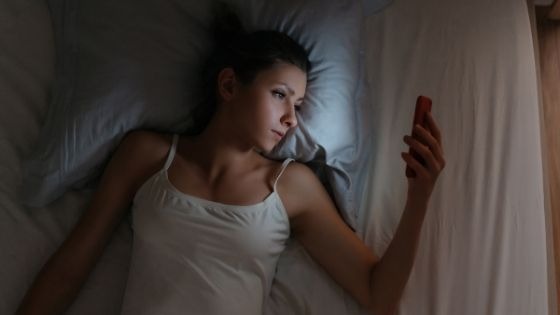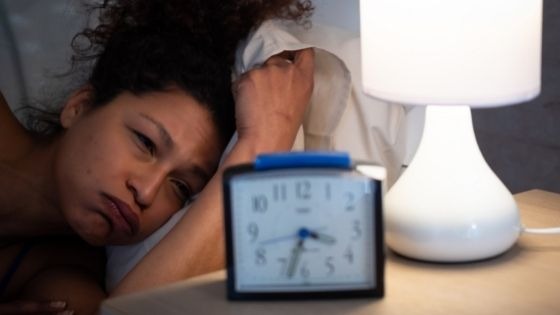Why can't I sleep? Causes and Remedies!

Do you have trouble sleeping? If you're having trouble getting to sleep or staying asleep, it can be frustrating. We've got some tips for how to get a better night's rest and stay healthy. But, why can't I sleep?
Insomnia is most often a manifestation of another disorder rather than a primary diagnosis.
Insomnia can be anything from difficulty falling asleep to waking up too early and not getting back to sleep. It affects people in all sorts of ways and lasts for different lengths of time.
Often, insomnia will come about in response to external factors like stress, anxiety, or depression. However, insomnia may also develop due to some other condition, such as an eating disorder.
It's common for people who are restricting their food intake (or are bingeing) to develop insomnia because their blood sugar gets too low at night. It could also be a side-effect of medication or some other medical issue.
What are the causes of insomnia?
Insomnia is a common problem that many factors can cause, including:
- Stress.
- Anxiety.
- Depression.
- An overactive or an underactive thyroid gland (hyper- or hypothyroidism)
- Iron deficiency anemia.
- Pain and disruption to sleep.
- The wake cycle is caused by medical conditions such as sleep apnea syndrome (SAS) and periodic limb movement disorder (PLMD) or seizures.
- Travel to a different time zone causes jet lag and poor sleep habits.
However, here are the top 10 reasons why people don't sleep well at night. You might find that one of these is affecting your sleep too!
1) Stress and anxiety
Stress and anxiety are often cited as the most common reasons for insomnia. If you find that you're overly stressed about work, finances, or your relationships, it can be hard to switch off at night.
Therefore, it's important to learn how to deal with stress productively; otherwise, these feelings can become overwhelming and lead to poor sleep. (Trusted source 1*)
2) Lack of exercise
If you didn't exercise yesterday, it's more than likely that you will have a bad sleep tonight. However, regular physical activity can improve your sleep in many ways.
For example, exercise helps to release endorphins which are feel-good chemicals in the body, and it also tires out the muscles, so sleep follows naturally. (2*)
3) Alcohol too close to bedtime
Drinking alcohol close to bedtime can lead to a restless night, so don't have that last glass of wine or beer hours before you plan on going to sleep.
Alcohol is a diuretic, which makes the body produce more urine, leading to dehydration. A dehydrated brain does not produce melatonin, nor does it sleep well. (3*)
4) Sugar-rich foods
Eating sugary food just before bed can keep you awake at night for several reasons. Firstly, sugar is a stimulant, so it will increase your energy levels and make it hard to sleep when eaten late at night.
Secondly, having sugary or carbohydrate-rich food too close to bedtime will lead to a spike in blood sugar levels which causes energy highs and lows throughout the night. (4*)
5) Not enough water or too much coffee
Not enough or too little fluid decreases sleep quality. For example, dehydration that affects less than 2% of your body weight can leave you wide awake at night, while drinking too much water before bedtime can cause you to wake up at night.
Drink enough water during the day so that your wee is clear and colorless and no more than two glasses of fluid just before bedtime.
Caffeine has been linked to some pretty serious side effects, and now a new study suggests that it could disrupt sleep. Researchers found that 400 mg of caffeine taken 0 or 6 hours before bedtime significantly disrupted their sleeping patterns, even after just one night! That's kind of scary when you think about how much coffee is consumed in the United States on any given day. (5*)
6) Too much food
Eating a large meal just before bed can also disrupt your sleep, as digestion diverts blood flow to the stomach away from the brain.
Again, this can disrupt your sleep and wake cycle. Instead, try to have a light snack that's rich in complex carbohydrates, such as an apple or some nuts, or take some time out for relaxation before bedtime. (6*)
7) Watching TV or using computers, tablets, and smartphones close to bed
Watching stimulating television shows, gaming, or using mobile phones, tablets, and computers close to bedtime has been shown to disrupt sleep quality.
Aim for a tech-free half hour before going to bed where you can unwind with a book that doesn't require much concentration. (7*)
8) Medications
Many medications have been linked to insomnia. One of the most common side effects is trouble falling or staying asleep for more than one in five people who take them. (8*)
9) Poor quality mattress or pillow
A poor quality sleeping surface can prevent you from getting a good night's sleep. Invest in a good quality mattress and pillow to avoid problems. (9*)
10) Sleep disorders and medical conditions
Many sleep disorders and medical conditions can also disturb your sleep. These include restless legs syndrome, hypersomnia, periodic limb movement disorder (PLMD), snoring, or obstructive sleep apnoea. (10*)
How to identify insomnia

Insomnia is a common problem that affects the quality of life. Frequently, this disorder does not receive attention at first because it seems to be subjective or psychological.
There are important differences between getting enough sleep and having insomnia:
If you find yourself always complaining about little time to sleep, feel tired during the day even if you have slept, reached the state where you feel annoyed by noise or light, be constantly thinking about feeling tired and restless.
If something bothers your sleep habits: frequent waking up in the night, inability to fall asleep even after trying hard for a long time, waking up earlier than expected, and having difficulties returning to sleep... these are signs that you may have insomnia.
Ways to treat insomnia
Insomnia is a sleeping disorder characterized by difficulty falling asleep, staying asleep, or non-restorative sleep. This condition is highly prevalent in the United States and often leads to feelings of anxiety and depression.
What are some ways to treat insomnia? Recommended measures for treatment include:
- Eating regular meals at set times.
- Avoiding caffeine.
- Exercising regularly.
- Practicing meditation or relaxation techniques.
If these steps fail to bring relief, you may want to try herbal remedies. Herbs have been used for centuries in medicine as natural sleep aids.
All herbs are safe when taken under proper conditions and under the supervision of a qualified health practitioner. When used properly, herbs can provide many health benefits, including aiding in the treatment of insomnia.
Herbs to treat insomnia
Here is a list of herbs that can help aid in the treatment of insomnia:
Kava Kava
This herb has been used to induce sleep and treat anxiety in people with sleep problems. It does so by reducing stress, alleviating muscle pain, and relaxing your body and mind so you can fall asleep more easily.
Valerian Root
This herb is well known for its sedative properties and can be used to treat insomnia. In addition, it is believed that the scent of valerian root has an aroma similar to that of marijuana, which may explain why it helps some people with insomnia.
Passion Flower
In addition to helping you fall asleep, this herb can also reduce anxiety and treat insomnia related to stress.
Hops
While not a sedative, this herb is believed to treat insomnia due to its calming effects. It is commonly used to treat sleep disorders such as restless legs syndrome (RLS) and periodic limb movement disorder (PLMD).
Lavender Plus
10x Extract Concentrated powder of lavender flowers from Bulgaria, free of pesticides and additives with guaranteed quality control. 2 grams = 1 teaspoon; 100g (400 teaspoons) in a jar.
Tips for managing sleep deprivation
Sleep can be elusive for many of us; we toss and turn as we wonder what happened to the day when we could do anything and everything with ease… And no doubt about it, getting a good night's sleep is key to looking on top of the world.
Trapped in an endless cycle, Wake up groggy, with a jolt, and regret that you missed out on another night of beauty sleep. Now you're tired, grumpy, and not at your best for work or play.
The result is a vicious cycle where lack of sleep leads to feeling even more stressed and sleep-deprived.
But by following these simple tips, you can gain back control of your nights and start enjoying sleep again – plus look and feel amazing as a bonus (and yes, we're talking fewer wrinkles, better skin tone, and even weight loss). So how can you get that shut-eye?
Make it happen
It's all about establishing a sleep routine. It's important to have regular sleeping times and rituals.
In fact, try not to go to bed too close to when you wake up (for example, don't get into bed at 10 pm if you wake up for work at 6 am).
Having a regular structure will help regulate your circadian rhythm. The sleep/wake cycle regulates many of our body's processes, including hormone production and digestion.
Establish a pre-bed ritual
Establish a pre-bed ritual so that your body is conditioned to associate particular things with going to sleep.
This could include taking a warm bath, reading a book, or having some quiet time alone. In addition, drinking warm milk has also been touted as a sleep inducer.
Make it comfortable
Follow the rules of Feng Shui. This ancient Chinese system aims to maximize good energy flow and avoid bad chi or negative energy.
You can apply this to your sleeping quarters by ensuring your bed is facing the right direction (head of the bed facing north).
Alternative medicine
Relaxation therapies such as yoga, meditation, or progressive muscle relaxation have been shown in studies to help reduce restlessness and induce sleep. Find what works for you.
Food for thought
Before bedtime, avoid high-energy foods like sugar and caffeine. Caffeine can take up to six hours to leave your system, so if you plan to have it after midday, give yourself time to clear out of your system before hitting the hay. On the other hand, sugar can impact sleep because of its stimulating effect on the central nervous system.
Finally…
If all else fails and you have trouble sleeping each night, talk to your GP about what options are available. However, don't give up the fight. It's time to reclaim your night!
Conclusion
Why can't I sleep? It's never easy to get a good night's sleep. So many factors influence the quality of our slumber, and it can be challenging for those who struggle with insomnia or other sleeping disorders.
In this blog post, we've provided some tips on how you can make your bedroom more comfortable and create an environment where you're ready to drift off into dreamland.
Our final tip is also important: don't give up! If all else fails and you have trouble sleeping each night, talk to your GP about what options are available (e.g., medication).
Remember, though, that there is hope. Reclaiming your nights starts by following these simple steps today!
Medically reviewed and approved by Nataniel Josue Alvarez M.D.
